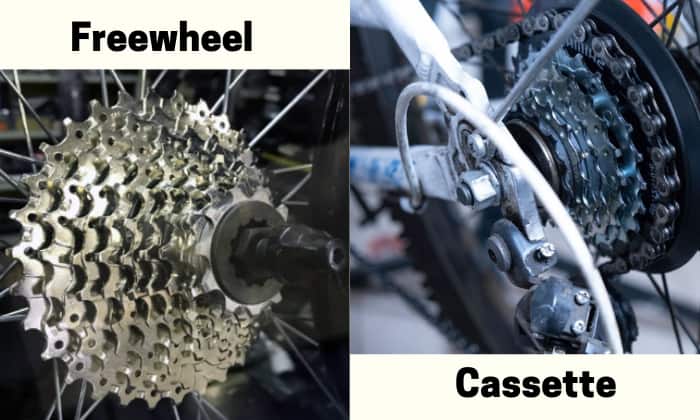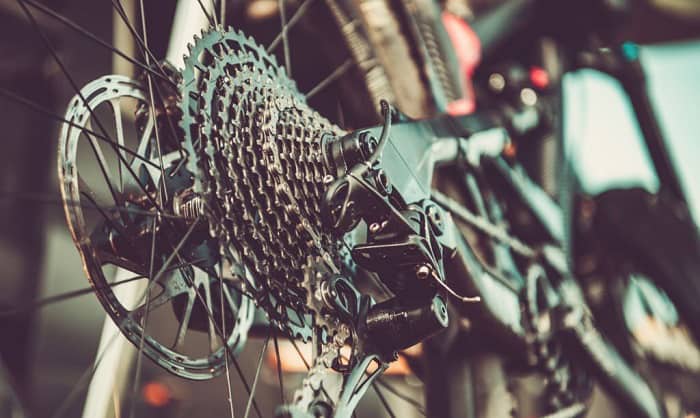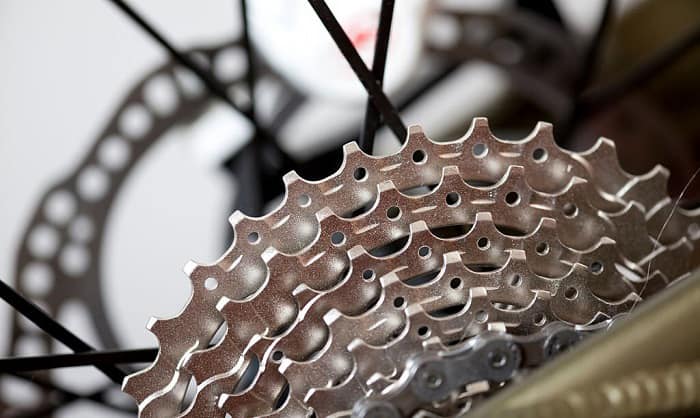Do not fret if you are using the terms freewheel and cassette identically. I assure you, it’s not just you. Checking this article about freewheel vs cassette is already a step in the right direction as we will show you their differences, usage, and benefits to your bike routine.
To start off, a typical bike has rear cogs or gears that are attached to the hub to help it operate. This hub has two different systems: a cassette and a freewheel system. Read on to see what freewheels and cassette freehubs are.
Table of Contents
Cassette and Freewheel on a Bicycle
These two systems almost look identical and perform the same function: to let you coast when you rest from pedaling. However, they have significant mechanical quirks that separate them from each other.
1. Freewheels
A bike freewheel is also called threaded hubs, which is the traditional type of rear hub. It comes with a ratcheting system and multiple sprockets bolted together.
Therefore, when these sprockets spin backwards, the freewheel’s extractor splines stay put.
Read more: Fixed gear vs freewheel: what is the difference?
2. Cassette and freehubs
Unlike the traditional threaded rear cup, a cassette is made without the ratcheting system.
It is composed of 8 – 12 cogs or gears that allow the lockring splines to move when the sprockets spin backward.
How Do They Work?
The freewheel acts as a sole unit where pedaling tightens it to the hub. Meanwhile, the cassette is a set of gears or cogs that slide onto the unit and is held in place by a lock ring.
A freewheel, also known as a block, has a single or set of sprockets mounted on a body with an internal ratchet mechanism and a threaded hub.
The freewheel screws directly in the rear wheel of your bike, and its lock mechanism is triggered when you pedal forwards, which forces the wheel to be driven by the train. When you are just cruising and not pedaling or going backwards, the freewheel hub spins rather freely, hence its name.
The cassette is the preferred alternative to modern bikes and has taken over the freewheel. Cassettes have a series of straight splines which form the connection between sprockets and the freehub.
Just like the freewheel hub, the entire cassette is held on the hub by a threaded lockring. Older cassette models used a threaded small sprocket to hold on to the larger splined sprockets.
Difference Between Freewheel and Cassette Hub
If you are still having a hard time telling freewheel and cassette apart, please refer to this summary:
| Freewheel | Cassette |
| Allow 5-7 levels of speed | 7-12 speed levels |
| Threads onto the back wheel | Not threaded onto the back wheel |
| Composed of multiple gears | Features 8 – 12 cogs |
| Extractor splines stays in place when the sprockets are spinning backwards | The lockring splines can turn when the sprockets are spinning backwards |
| Traditional type, more affordable | Lastest version, thus pricier |
| Generally found in beginner or vintage bikes | Found in modern, usually upgraded models |
| Heavier build | Lighter build |
Pros and Cons
1. Freewheel
- Requires little maintenance during use
- Replacement is easy with two bearings
- Reliable and durable for long-term use
- Ideal for casual riding, as it allows easy cruising
- Affordable to purchase and repair
- A bit heavier than a cassette
- Requires more frequent replacement
- The freewheel is tightened to the hub over the time
2. Cassette
- A durable and modern system for biking
- Lighter and less bulky
- Fewer issues with broken axles
- Many types of bike cassettes to choose from, including the number of sprockets, varying speeds, etc.
- More expensive than traditional freehubs
- Has more parts that need frequent maintenance
Freewheel Vs. Cassette: How to Tell It Apart
1. Remove the back wheel and spin the gears backward
If the tool fitting and the bike gears turn, it’s a cassette system. Your bike has a freewheel hub if the tool fitting does not revolve or rotate with the gears.
2. Identify it by how it looks
If you’re still not sure, you can identify it by looking at it. Freewheel axles are slightly recessed within the axle. And cassettes are usually visible with the face of the gears, and there are numerous splines visible around the periphery.
Indeed, you can always upload photos of the machinery on social media like Reddit or Facebook to get an answer from experienced bikers and mechanics.
Should I Choose Cassette Vs Freewheel?
Casual riders frequently prefer a freewheel system due to its smaller number of gears. As a result, if you want to bike casually, the freewheel system is well worth considering.
Additionally, most vintage or retro bikes come in freewheels as they were the earlier hub type and have a lower price.
Meanwhile, if you wish to save a bit of weight, then cassette systems may be for you. They are made for heavy riding and off-road adventures. T
Buying and Replacing Sprockets
There are instances where you feel you must upgrade. If you are operating a freewheel mountain bike, there are ways to improve your ride quality by replacing your sprockets.
Yes, there is a way to convert freewheel to cassette.
Note that a bike with freewheel is usually screwed to the rear hub, while a cassette is only slid onto your hub splines and held in one place by a lock ring.
The rear hub also differs for both types, so it is recommended to identify it first before removing and replacing the sprockets.
Conclusion
To end the question once and for all: which is better, freewheel vs cassette? The answer lies in your intention. If you wish to use your bike casually around town or to run errands, a freewheel should suffice. It is cost-effective and does not require much maintenance.
However, if you are committed to maximizing your bike by taking it off-road, then a cassette may be for you.

“I ride my bike to work for years, but is that enough? Our carelessness towards our surroundings has taken a toll on the environment. And now, everyone is responsible for changes; even the most minor contribution is counted. With this hope and spirit, I started with my partner to establish Biketoworkday to help more individuals commute to their work sites on their bikes.”



